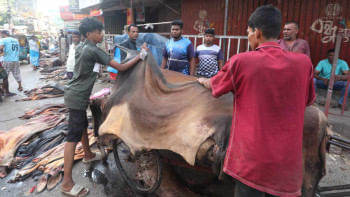Indian enclaves in 2 dists safe havens for criminals
Most of the 12 Indian enclaves in Thakurgaon and Panchagarh districts are safe havens for criminals.
After committing crimes in Bangladesh, they take shelter in the enclaves because Indian authorities seldom take any interest in the people there, sources in Bangladesh administrations and BDR said.
Bangladesh police and BDR need Indian authorities' permission to enter the enclaves, they said.
Taking this advantage, these enclaves have become transit points for smuggling of drugs, arms and other goods. Hemp is now replacing crops and vegetables in many areas as this is much more profitable and has ready markets in Bangladesh, they said.
Even Bangladeshis take shelter in the enclaves after committing crimes.
The enclaves are Putimari, Daibata, Sharbari, Nataktopa, Garati, Singimari, Nazirgoaj, Balapara, Gaihata, Ghagraghata, Kotbazini and Shal, covering about 11,232 acres of land with a total population of 16,205. Most of the smaller enclaves are several kilometres inside Bangladesh.
According to enclave people, hemp is cultivated on large scale in about 10 of the enclaves in the two districts.
Sources in Thakurgaon Department of Agriculture Extension (AED) also said there are about 1,120 hectares of cultivable land in Thakurgaon enclaves and 1,942 in Panchagarh enclaves.
Hemp cultivation started in the enclaves about four years back. It has doubled within the short period, the AED sources said.
Organised smugglers' syndicates both in Bangladesh and India provide the enclave people with inputs like seed and tertiliser for hemp cultivation and buy back the product at good prices.
Sources in Panchagarh AED said the lands are losing fertility due to continuous cultivation of hemp.
During a recent visit to Putimari, Daibata, Sharbari, Nataktopa, Garati and Singimari, local people said farmers who used to cultivate jute, rice and vegetables earlier now grow hemp. Some are however trying maize, a new crop in the area.
It was gathered that hemp is being cultivated on at least 2,180 acres of land in these enclaves.
As huge quantities of firewood are needed to dry hemp, producers procure the firewood mostly by stealing trees from Bangladesh territories under cover of darkness, they claimed. Greens are disappearing around the enclaves.
Another reason of large scale hemp cultivation is that Indian authorities do not care to supply them seed, fertiliser and insecticide for vegetable cultivation, they said. Besides, there are problems in marketing vegetables grown in the enclaves.
"We prefer hemp cultivation because the profit is assured, unlike in case of vegetables", a resident at Putimari said.
When contacted a police official in Panchagarh said they know what goes on in Indian enclaves. "But we can not enter there to track down criminals or destroy hemp fields", he said seeking anonymity. The crimes include robbery, extortion and theft.
An official of 15 Rifle Battalion said they informed BSF that criminals hide in the enclaves and that hemp is being cultivated in large scale there. Only BSF can nab the criminals, he added.
But the enclave people have also allegations. They are deprived of all facilities including healthcare, education and water supply, which are supposed to be provided by the Indian government.
There is virtually no administration in the enclaves.
The enclave people often move freely inside Bangladesh and avail all facilities to earn their livelihood, people in Bangladesh territories near the enclaves said.

 For all latest news, follow The Daily Star's Google News channel.
For all latest news, follow The Daily Star's Google News channel. 



Comments